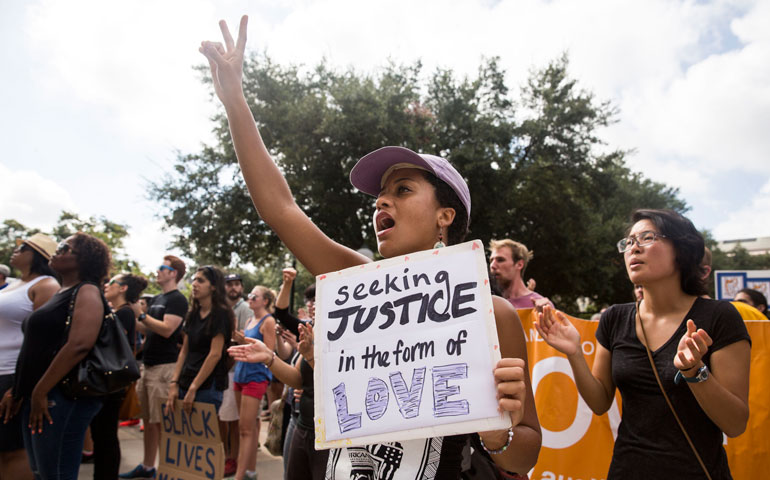
Ursula Walker rallies with Black Lives Matter Austin at the Texas State Capitol on Sept. 19, 2015. (AP/San Antonio Express-News/Carolyn Van Houten)
Editor's Note: From the archives, NCR brings you this piece written in celebration of 2016's 30th anniversary of Martin Luther King Jr.'s birthday.
It has been 30 years since the nation began celebrating Martin Luther King Jr.'s birthday as a holiday. King would have been 87 years old in 2016. We certainly do not live in the "world house" King envisioned in one of his last books, Where Do We Go From Here: Chaos or Community?
2015 seems to have been a year in which we chose chaos over community in far too many ways. How many days of 2015 were there no police shootings of unarmed men, women and children? How many days did we hear politicians spewing hate? How many days did we actually devote to creating racial equity?
I believe that there is a way beyond the chaos, fear, hatred and violence. How do we create the conditions of the possibility of building the "world house" King envisioned toward the end of his life? It will certainly demand that we risk the way of nonviolence King fashioned in the tradition of Mahatma Gandhi.
There is a scene in Richard Attenborough's classic film "Gandhi" (1982) that captures precisely what we need in America today. Toward the end of the film, when Hindus and Muslims are rioting and fomenting terror against each other, Gandhi goes on a six-day fast to demand an end to the violence. Gandhi's friends are concerned that he is dying.
A Hindu man enters the scene, throws bread at Gandhi and demands that Gandhi eat because he does not want Gandhi's death on his soul. He further explains that he is in hell because he smashed the head of a Muslim child against a wall.
Gandhi responds, "I know a way out of hell." Gandhi tells the Hindu to go find a Muslim child who has lost his parents to the violence. He further instructs the Hindu to raise the Muslim child as a Muslim. Recognizing Gandhi's wisdom, the Hindu falls to his knees, his eyes full of tears and hope that there is a way out of hell.
This scene from the film "Gandhi" serves as a metaphor for what we need to do as a nation to create the conditions for the possibility of racial equity. It underscores the wisdom of the #BlackLivesMatter and #SayHerName movements of 2015. Gandhi did not instruct the Hindu to raise any child. He did not simply instruct the Hindu that "all lives matter."
All lives do not matter until we learn to raise as our own those children whose lives have been deemed least worthy by society. Until a critical mass of white parents learn to walk in the shoes of African-American, Latino, Native American and Asian-American parents, we will not take steps toward the "world house" of love and justice envisioned by King.
Imagine if white parents raised an African-American child in an African-American community, facing the same challenges of underfunded schools, policing and emergency services. Imagine if white parents had to raise African-American children under the punitive conditions of the school-to-prison pipeline. How would white parents react when their child was reprimanded, shackled or arrested for doing nothing more than being a child?
If white parents were going to raise children from another race in that child's community, white parents would necessarily undergo a cultural shock that they never imagined. They might be forced to ask: Is this America?
More importantly, I hope that we recognize our own need for transformation, our own need to find a different way of creating one common home for all of our children. We need to re-imagine what we mean by "home" and to enlarge our social, moral and spiritual imaginations about what it means to parent and create home in 21st-century America.
Related: From MLK to Ferguson: Catholic identity and the struggle for racial justice
We need to expand our moral and spiritual imaginations to break boundaries and see how we only have one common home -- the Earth -- as Pope Francis teaches. We will need to meet and nurture new relatives, especially those whom we have forgotten, those whom we may despise, those whom we have condemned to struggle to live in less-than-human conditions.
White Americans will need to unlearn privilege and our own bias. Yet we will not unlearn our privilege and bias until we inhabit, dwell and live in African-American, Latino, Native American and Asian homes and communities.
In a very real way, white Americans will need to grow into a new skin. We white Americans will need to learn what it is like to grow up in darker skin. White Americans will need to inhabit and dwell within an entirely new way of seeing, a new set of symbols, and a new way of living.
If white Americans were to take up Gandhi's wisdom to find a way out of hell, it would certainly involve walking the way of Jesus, of compassionately suffering with all of our darker-skinned brothers and sisters. It would certainly be a dangerous way.
Yet it would also be a way toward a new creation, a way whereby we become co-creators of one common home and an authentic humanity gathering together in the "world house." May we risk our lives on that way for all of our children, and then we may yet glimpse how we are one in God's kingdom.
[Alex Mikulich is co-author of The Scandal of White Complicity in U.S. Hyper-Incarceration: A Nonviolent Spirituality of White Resistance.]



